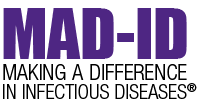MAD-ID Program Highlight: PGY2 Infectious Diseases Pharmacy Residency Program, Froedtert & the Medical College of Wisconsin
- lwilliams10697
- Nov 3, 2025
- 2 min read
Program Director: Allison Gibble, PharmD, BCIDP

Tell us about your PROGRAM
This residency program is designed to provide an advanced experience in infectious diseases clinical practice and antimicrobial stewardship. The ID residency combines several required rotations (immunocompetent and immunocompromised ID services, antimicrobial stewardship, antimicrobial stewardship administration, microbiology, HIV/OPAT clinic) with elective rotations (bone marrow transplant, heme/onc, solid organ transplant, emergency medicine, MICU, SICU, academia, pediatric ID) which allows the resident to tailor the year to meet his/her objectives. Research projects, active participation in the antimicrobial stewardship team, teaching activities, and precepting students and residents are integral components of the residency program as well. The overall goal of this residency program is to develop a well-rounded, independent practitioner who is an integral member of ID multidisciplinary teams.
What makes your program UNIQUE?
Because of our close relationship with the Medical College of Wisconsin School of Pharmacy, our program provides multiple opportunities, both required and elective, to explore involvement in academia as a part of their future career. We are also fortunate to have nine ID-trained pharmacists as core preceptors of our program that the resident has the opportunity to learn from during their training.
What opportunities are there for RESEARCH and QUALITY IMPROVEMENT in your program?
The PGY2 ID resident is required to complete a year-long research or quality improvement project with the option to complete a secondary project depending on the resident's interest. When selecting the year-long project, we typically have both research and QI projects that the resident can choose from. Our current resident completed a research project investigating the optimal duration of antibiotic therapy for patients who are bacteremic due to a urinary stone.
What QUALITIES are you looking for in a successful trainee?
A few of the top qualities we seek are passion for ID pharmacy practice, strong organization and time management skills, and demonstration of being able to receive and incorporate feedback.
What CAREER paths have past trainees pursued, and how does your program support trainees in finding job opportunities?
Our program is designed to develop a well-rounded ID clinical pharmacist who is prepared to practice in multiple practice areas, including supporting ID consult service, working in an ID clini,c including OPAT program management, and antimicrobial stewardship program coordination. This will be the 10th year for our program, so we have a wide network of previous residents who have been helpful with connecting graduating residents to job opportunities in their area.
MAD-ID Training Program Highlight
This series highlights ID pharmacy training programs, including PGY2 ID residency and ID fellowship programs that send trainees to the MAD-ID Annual Meeting. We provide an opportunity for program directors to give insights into their offerings that mean most to prospective trainees.
If you are interested in highlighting your ID pharmacy training program, please contact David Ha at dha@stanfordhealthcare.org.




Comments